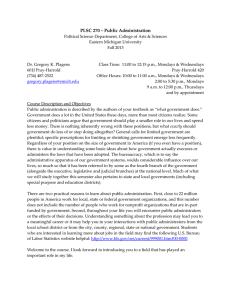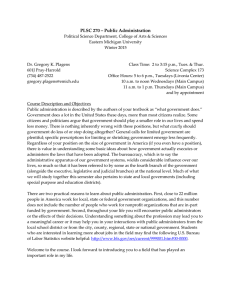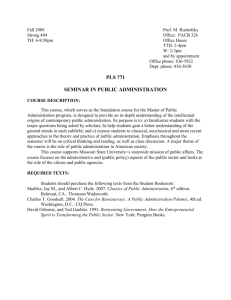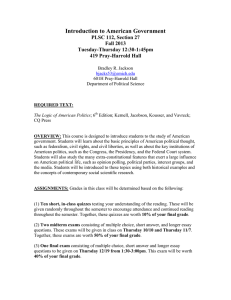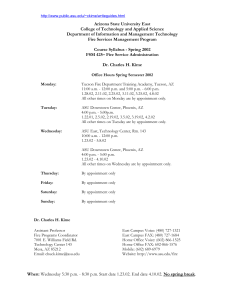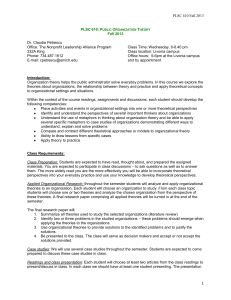PLSC 270 – Public Administration
advertisement
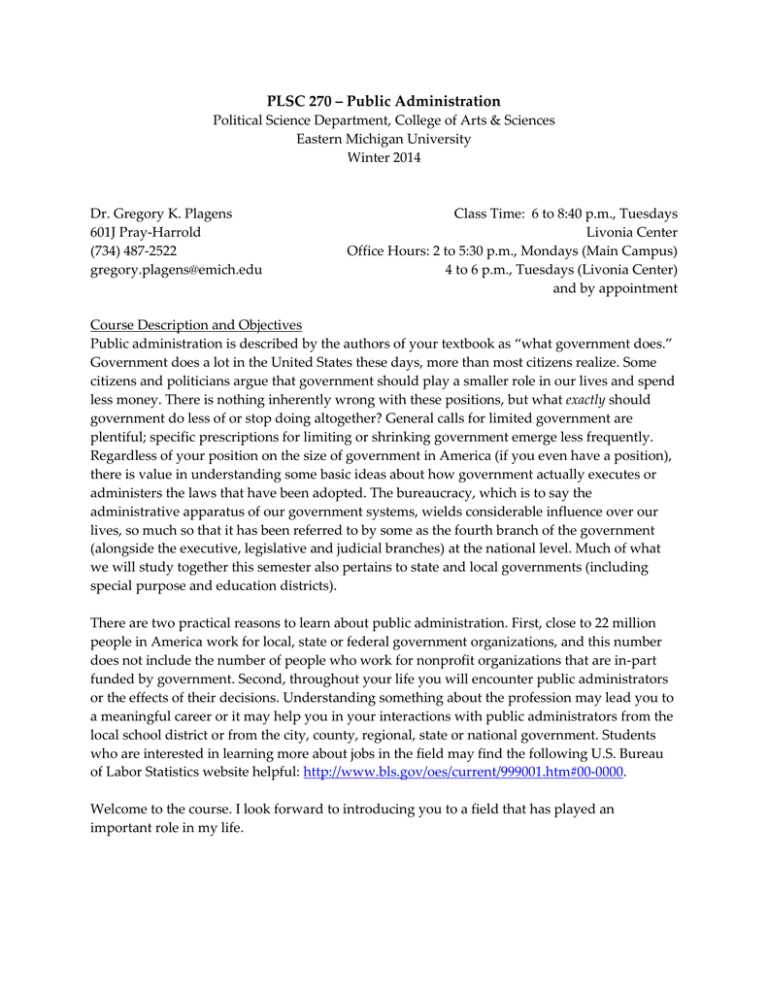
PLSC 270 – Public Administration Political Science Department, College of Arts & Sciences Eastern Michigan University Winter 2014 Dr. Gregory K. Plagens 601J Pray-Harrold (734) 487-2522 gregory.plagens@emich.edu Class Time: 6 to 8:40 p.m., Tuesdays Livonia Center Office Hours: 2 to 5:30 p.m., Mondays (Main Campus) 4 to 6 p.m., Tuesdays (Livonia Center) and by appointment Course Description and Objectives Public administration is described by the authors of your textbook as “what government does.” Government does a lot in the United States these days, more than most citizens realize. Some citizens and politicians argue that government should play a smaller role in our lives and spend less money. There is nothing inherently wrong with these positions, but what exactly should government do less of or stop doing altogether? General calls for limited government are plentiful; specific prescriptions for limiting or shrinking government emerge less frequently. Regardless of your position on the size of government in America (if you even have a position), there is value in understanding some basic ideas about how government actually executes or administers the laws that have been adopted. The bureaucracy, which is to say the administrative apparatus of our government systems, wields considerable influence over our lives, so much so that it has been referred to by some as the fourth branch of the government (alongside the executive, legislative and judicial branches) at the national level. Much of what we will study together this semester also pertains to state and local governments (including special purpose and education districts). There are two practical reasons to learn about public administration. First, close to 22 million people in America work for local, state or federal government organizations, and this number does not include the number of people who work for nonprofit organizations that are in-part funded by government. Second, throughout your life you will encounter public administrators or the effects of their decisions. Understanding something about the profession may lead you to a meaningful career or it may help you in your interactions with public administrators from the local school district or from the city, county, regional, state or national government. Students who are interested in learning more about jobs in the field may find the following U.S. Bureau of Labor Statistics website helpful: http://www.bls.gov/oes/current/999001.htm#00-0000. Welcome to the course. I look forward to introducing you to a field that has played an important role in my life. PLSC 270 Page 2 Course Resources Required Shafritz, Jay M., E.W. Russell and Christopher P. Borick. 2013. Introducing Public Administration, 8th Edition. Upper Saddle River, N.J.: Pearson. Additional readings will be posted in Adobe Acrobat (pdf) format in the e-College course shell that has been created for the course. You will find the website here: https://secure.ecollege.com/emu/. If you have not registered for an account, please do so promptly. Technical support information is also available at the link above. Course Objectives Students will learn the following: to identify subfields of public administration and some of the basic functions of professionals in those subfields; to think about the political context in which public administrators work; to identify major efforts to reform administrative organizations in government; to identify how governments, nonprofit organizations and private entities collaborate to provide public programming; to identify the challenges of serving in managerial roles; to identify the challenges of finding and developing human capital; to consider the ethical challenges that public administrators face; to consider the challenges that emerge when individuals join organizations and attempt to work cooperatively toward some desire outcome; to understand the role of data collection and measurement in public organizations. Course Activities to Meet Objectives: I have organized readings, discussion and lecture materials, in-class case studies (with accompanying short writing assignments) and exams to guide you toward the objectives stated above. You are expected to read assigned material prior to the class when it will be covered. This helps facilitate discussion and give you some context in which to consider my next lecture. In the event that I fall behind on material, you should continue reading as assigned. Reading before and after the lecture will provide you with a deeper understanding of the material. Students are encouraged to read strategically and with time constraints in mind. I’ll explain what I mean by this in class. Course discussions and lectures have been designed to simplify and illustrate ideas covered in the readings. The activities of reading, listening and speaking are purposefully coordinated to help you internalize the ideas being presented. Students who skip readings and count on me for the highlights are less likely to learn the material. Students who skip class and rely on the readings will miss elaboration, discussion and examples that will be useful to demonstrating competency through writing and exams. You are expected to read, attend and participate in class. If you believe your personal circumstance warrants an exception to this expectation, you should see me at the start of the semester to discuss your situation. PLSC 270 Page 3 I need to assess your progress toward the stated objectives of the course, and to do this I will use short writing assignments (tied to the case studies on the syllabus) and in-class exams. All students begin the course with a zero. I assume that you are entering with no knowledge of the subject being covered. Your final grade will reflect your ability over the semester to demonstrate understanding of the material presented. Students must work independently when completing writing assignments and examinations. This does not mean that you cannot talk to a classmate about a writing assignment before it is due. Talking about a subject with a friend or family member can lead to deeper understanding. Talk all you like. When it comes to completing each writing assignment, be sure that it is an original work created by you. The exams will be independent work done in class. Both forms of assessment are explained in more detail below. Assessments The assessments for this course and their weights toward your final grade are detailed below: 1. Case Study 1 (10 percent) Assigned: Jan. 14 Due: Jan. 21 2. Exam 1 (10 percent) Date: Feb. 4 3. Case Study 2 (15 percent) Assigned: Feb. 11 Due: Feb. 18 4. Exam 2 (15 percent) Date: Mar 4 5. Case Study 3 (15 percent) Assigned: Mar. 18 Due: Apr. 8 6. Exam 3 (15 percent) Date: Apr. 1 7. Exam 4 (15 percent) Date: Apr. 22 8. Best Grade (5 percent) The case study writing assignments are an alternative means by which I will try to understand how well you understand the material this semester. They are also a means by which I can determine the extent to which you can apply what we are covering. Short writing assignment instructions will be distributed the night the case study is discussed. To be clear about my expectations for assessments, I offer the following: Exams are to be taken in-class the days they are offered, and case studies are to be turned in at the start of class the night they are due. I reserve the right to deny make up exams and to penalize or refuse papers that are late or turned in by e-mail. Any exception to these expectations must be discussed with me in advance of the exam or paper due date. PLSC 270 Page 4 Case Study Short Writing Assignments Assignments will be discussed and distributed in class, as well as posted to the e-College website in case you misplace your copy. You will be given at least one week to complete each assignment. Short writing assignments will come with clear expectations for word count, usually in the range of 500 to 700 words per assignment. You will be graded on the following three criteria: How well you have followed the instructions provided, i.e. did you do the assignment as requested; The quality of your exposition, i.e. proper word usage, sentence structure, etc.; Exams Exams are to be taken with books and notebooks closed and with phones, tablets and computers off. Despite the seemingly unnatural state of this environment, I believe it to be necessary for assessing your understanding of the material. Exams will be graded on a numeric scale from zero to 100. More details about the content and format of the exams will be shared closer to the date, but essentially they will be multiple choice, true/false, fill in the blank and short answer questions derived from readings, lecture and discussions, and case study material. The following process for the final exam will be observed, as outlined in the undergraduate catalog: You are to take the examination with the class and at the hour indicated on the examination schedule. Failure to take the examination at the scheduled time will result in a grade of F on the exam, except when the requisite conditions for granting an incomplete are present or one of the following conditions applies and a suitable alternative is agreed to in advance: o If you find that you have three examinations scheduled on one day, you may request the instructor of the class having the first examination of the day to arrange to offer the examination at another time. If you find that you have four examinations scheduled for one day, you may request the instructors of the first two examinations to make arrangements so that no more than two are scheduled in one day. You may appeal to the head of the department in which the course is offered if a satisfactory solution is not reached; o If for religious reasons you are not able to follow the examination schedule you should make special arrangements with me. If arrangements are not satisfactory, you may appeal to the head of the department in which the course is offered; o Any deviation from the examination schedule, other than to limit the exams to two in one day or to observe religious mandates, must be approved in advance by me (and possibly the department head) and will be granted only in cases of extreme emergency. Grading Scale and Numeric Conversions Grades for the case study short writing assignments will be awarded on a letter scale. The letter equivalencies and corresponding numeric conversion for use in calculating final grades are as follows: PLSC 270 A AB+ B BC+ C CD+ D DF Page 5 Exceptionally High Order 97/100 92/100 89/100 Distinctly Above Average 86/100 82/100 79/100 Average 76/100 72/100 69/100 Below Average 66/100 62/100 Unsatisfactory (denoting failure) 50/100 Grades for the in-class exam are on a numeric scale ranging from zero to 100. If you do not turn an exam or if you do not turn in the case study short writing assignment, you will earn a zero for that portion of the exam. Overall course grades are determined based on the following scale: A Exceptionally High Order 93+ A90-92 B+ 87-89 B Distinctly Above Average 83-86 B80-82 C+ 77-79 C Average 73-76 C70-72 D+ 67-69 D Below Average 63-66 D60-62 F Unsatisfactory (denoting failure) Below 60 Students who track their performance throughout the semester and wish to compute various possible final outcomes will find the following formula for Microsoft Excel helpful: =( CS1 * 0.1) + (Exam1 * 0.1) + (CS2 * 0.15) + (Exam2 * 0.15) + (CS3 * 0.15) + (Exam3 * 0.15) + (Exam4 * .015) + (BestScore * .05) University Services to Assist You in Learning Disability Resource Center It is my goal that this class be an accessible and welcoming experience for all students, including those with disabilities that may impact learning in this class. Students who believe they may have trouble participating or effectively demonstrating learning in this course should meet with me (with or without a Disability Resource Center (DRC) accommodation letter) to discuss reasonable options or adjustments. During our discussion I may suggest you contact the PLSC 270 Page 6 DRC (240K Student Center; 734-487-2470; drc@emich.edu) to talk about academic accommodations and the need for an accommodation letter. You are welcome to talk to me anytime during the semester about such issues, but it is always best if we can talk at least one week prior to the need for any modifications so that I can plan accordingly. University Writing Center The University Writing Center (115 Halle Library; 487-0694) offers one-to-one writing consulting for both undergraduate and graduate students. Students can make appointments or drop in between the hours of 10 a.m. and 6 p.m. Mondays through Thursdays and from 11 a.m. to 4 p.m. on Fridays. Students should bring a draft of what they’re working on and their assignment sheet. The UWC offers small group workshops on various topics related to writing (e.g., Organizing Your Writing; Incorporating Evidence; Revising Your Writing; Conquering Commas; Using APA or MLA). Workshops are offered at different times in the UWC. Visit the UWC page (http://www.emich.edu/uwc) to see our workshop calendar. To register for a workshop, click the link from the UWC page for the type of workshop you wish to attend. The UWC also has several satellite sites across campus. These satellites provide writing support to students within the various colleges. For more information about our satellite locations and hours, visit the UWC web site: http://www.emich.edu/uwc. The Academic Projects Center (116 Halle Library) also offers one-to-one writing consulting for students, in addition to consulting on research and technology-related issues. The APC is open 11 a.m. to 5 p.m. Mondays through Thursdays for drop-in consultations. Additional information about the APC can be found at http://www.emich.edu/apc. Students visiting the Academic Projects Center or any of the satellites of the University Writing Center should also bring with them a draft of what they’re working on and their assignment sheet. Course Outline and Reading Schedule Week One – Jan. 7 Topic: Review of Syllabus Introduction to Major Ideas and Themes of the Course Required Reading None Week Two – Jan. 14 Topic: Defining Public Administration Required Reading Shafritz, Russell & Borick, Ch. 1 Fournier, Rob. 2013. “The Outsiders: How Can Millenials Change Washington If They Hate It?” The Atlantic, Aug. 26. Rein, Lisa. 2013. “Waive of Retirements Hitting Federal Workforce.” The Washington Post, August 26. PLSC 270 Page 7 Week Three – Jan. 21 Topic: The Political and Cultural Environment of Public Policy and Its Administration Topic: Case Study: Babcock Place and the Making of a “Simple” Crosswalk Required Reading Shafritz, Russell & Borick, Ch. 2 Michigan Department of Treasury. 2013. “How a Financial Emergency Works: A Summary of the Local Fiscal Stability and Choice Act Process.” Accessed August 29. http://michigan.gov/treasury/0,1607,7-121-1751_51556-198770--,00.html. Holeywell, Ryan. 2012. “Last Best Hope.” Governing. May, 34-40. Week Four – Jan. 28 Topic: The Continuous Reinventing of the Machinery of Government Required Reading Shafritz, Russell & Borick, Ch. 3 Raskin, David. 2012. “Home Improvement.” Governing. May, 54-58. Walters, Jonathan. 2012. “Holding the Safety Net.” Governing. August, 40-44. Week Five – Feb. 4 Topic: Exam 1 Topic: Intergovernmental Relations Required Reading Shafritz, Russell & Borick, Ch. 4 Scott, Dylan. 2012. “Over-the-Counter Culture.” Governing. August, 24-30. Southall, Ashley, and Jack Healy. 2013. “U.S. Won’t Sue to Reverse States’ Legalization of Marijuana.” The New York Times, August 30. Week Six – Feb. 11 Topic: Honor, Ethics, and Accountability Topic: Case Study in Accountability and Ethics Required Reading Shafritz, Russell & Borick, Ch. 5 Miller, Geralyn M. 2004. “Public Scrutiny and Accountability: An Ethical Dilemma in State Administration.” In Public Administration: Cases in Managerial Role-Playing, edited by Robert P. Watson, 110-113. New York: Longman. Week Seven – Feb. 18 Topic: The Evolution of Management and Organization Theory Required Reading Shafritz, Russell & Borick, Ch. 6 Gilbreth, Frank B. Jr. and Ernestine Gilbreth Carey. 1948. Cheaper by the Dozen. New York: Thomas Y. Crowley Co. (Ch. 10, Motion Study Tonsils: 97-113) Week Eight – Feb. 25 Winter Recess: No Class PLSC 270 Page 8 Week Nine – Mar. 4 Topic: Exam 2 Topic: Organizational Behavior Required Reading Shafritz, Russell & Borick, Ch. 7 Maylett, Tracy M. and Julie Nielsen. 2013. “Halting the Engagement Exodus.” The Public Manager. Accessed January 3. http://community.thepublicmanager.org/cs/blogs/featured/archive/2012/03/14/haltingthe-engagement-exodus.aspx. Week Ten – Mar. 11 Topic: Organizational Behavior (continued) Topic: Managerialism and Information Technology Required Reading Shafritz, Russell & Borick, Ch. 8 Barrett, Katherine and Richard Greene. 2012. “Bottleneck Basics: Efficiency Comes from Finding and Fixing the Spot that’s Gumming Up the Works.” Governing. February, 58-9. Towns, Steve. 2012. “A Tale of Two Cities: Is Cloud Security in the Eye of the Beholder?” Governing. February, 60. Week Eleven – Mar. 18 Topic: Strategic Management and Government Regulation Topic: Case Study in Evaluating Alternatives Required Reading Shafritz, Russell & Borick, Ch. 9 Feuer, Alan. 2013. “The Mayor’s Geek Squad.” The New York Times, March 23. Suzuki, Peter T. 2002. “Stranger in a Strange Land: A Non-Indian Administrator Working on an Indian Reservation.” In Public Administration: Cases in Managerial RolePlaying, edited by Robert P. Watson, 39-42. New York: Longman. Week Twelve – Mar. 25 Topic: Leadership Required Reading Shafritz, Russell & Borick, Ch. 10 Bryant, Adam. 2012. “Where Ideas are Always on the Wall.” The New York Times, January 7. Bryant, Adam. 2011. “To Stay Great, Never Forget Your Basics.” The New York Times, December 17. Week Thirteen – Apr. 1 Topic: Exam 3 Topic: Personnel Management and Labor Relations Required Reading Shafritz, Russell & Borick, Ch. 11 Kerrigan, Heather. 2012. “Off the Clock: 9-5 Is so 2011.” Governing. April, 47-49. PLSC 270 Page 9 Week Fourteen – Apr. 8 Topic: Personnel Management and Labor Relations (continued) Topic: Social Equity Required Reading Shafritz, Russell & Borick, Ch. 12 Maciag, Mike. 2013. “Work Happy: Despite Recent Hardships, Some Agencies Are Becoming Better Workplaces.” Governing. August, 52-55. Holeywell, Ryan. 2013. “Detroit Strong: The Would-Be Saviors of the Motor City.” Governing. June, 28-39. Reinke, Saundra. 2002. “Picking Up the Pieces: Grievances in the Hiring Process.” In Public Administration: Cases in Managerial Role-Playing, edited by Robert P. Watson, 60-62. New York: Longman. Week Fifteen – Apr. 15 Topic: Public Financial Management Topic: Major Themes of the Course Revisited Required Reading Shafritz, Russell & Borick, Ch. 13 Governing. 2012. “Bankruptcy in Anytown, USA.” May, 11. Petersen, John E. 2012. “The Other Stockton Story: The City’s Fiscal Tale of Woe May Set Precedents in How Debts Are Resolved.” Governing. May, 66. Maciag, Mike. 2013. “Local Bridges in Bad Shape.” Governing. August, 56-57. Walsh, Mary Williams. 2013. “Detroit Gap Reveals Industry Dispute on Pension Math.” The New York Times, July 20. Updated Readings on Detroit’s Financial Status (TBD) Exam Week – Apr. 22 Topic: Exam 4 6 to 8:40 p.m., Tuesday, Apr. 22 (same room as all meetings this semester)
